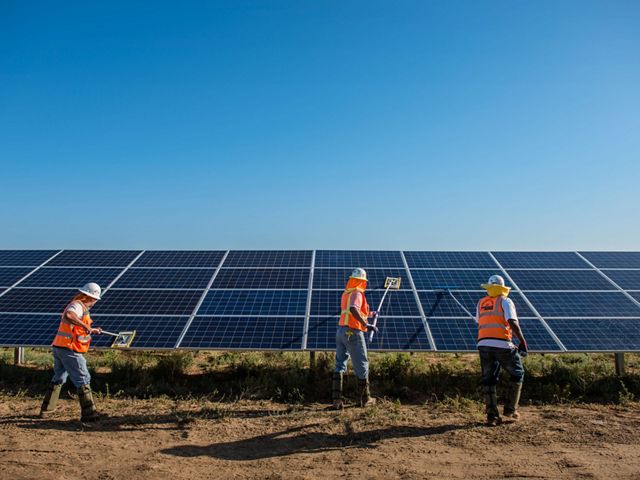During March Madness, one is reminded that a winning basketball season is never the product of a single player’s ability. It requires teamwork—a group of players executing plays, scoring points and playing strong defense. Climate change, more so than almost any other challenge we face as a planet, will not be fixed by one nation acting alone. A true team effort led to the Paris agreement where over 190 nations participating in the United Nations Framework Convention on Climate Change voted in favor of the agreement to jointly tackle climate change by reducing global warming pollution.
U.S. leadership on climate action proved no small factor in getting nations like China to be a team player in Paris. Indeed, the joint statement by the United States and China in November 2014 all but assured that the two most important players in the global economy would be working off the same playbook at the COP negotiations later that year. The commitment of the United States and other major country governments to climate action also encouraged many of the world’s most important private sector companies to publicly back the aims of the Paris Agreement, and state their commitment to creating a low-carbon future for our economy.
Indeed, the Paris Agreement has become a catalyst for action at every level to address the urgency of climate change. China is implementing a nationwide cap-and-trade program to reduce emissions. Over 70% of U.S. corporations surveyed by consulting firm PWC indicated that they would be making purchases of renewable energy to power their operations in the near future. The European Union has committed to having 20% of its power needs from renewable sources by 2020.
Quote
There is a growing understanding that doing nothing about climate change is not a viable position.
Yet with all these potential solutions, and with the private sector and the rest of the world stepping up their game on climate, the new Administration is at best diffident, at worst hostile to climate action. Research programs that assess impacts from climate change and look for solutions are being defunded. Settled fuel economy standards that not only lead to cleaner air but save consumers money are being set aside. There is vacillation as to whether to stay in the Paris Agreement. The United States has gone from being the captain of the team, a leader and a shot-caller, to benching itself.
Meanwhile, the consensus that something must be done about climate change is growing among Republicans. Representatives Stefanik, Curbelo and Costello, as part of a coalition including 17 Republican House Members, have introduced a resolution asserting climate change is real and must be addressed, and are backed by the growing Climate Solutions Caucus. And a bipartisan group of 20 state governors sent a letter to the Trump Administration urging increased support for wind and solar power. A group of respected long-standing leaders of the Republican party joined recently with the Climate Leadership Council to float a carbon pricing proposal that would lead to even greater overall estimated emissions reductions than the Clean Power Plan. While we’re a long way from the consensus we need, there is a growing understanding on both sides of the aisle that doing nothing about climate change is not a viable position—whether for risk management or global competitiveness.

That’s in no small part because the very same measures that will address climate change also offer significant economic benefits. The solar energy workforce grew by 25% in 2016 alone, and wind employment grew by over 30 percent in the same year. In fact, the solar industry in the United States is adding jobs at 12 times the rate of the U.S. economy as a whole. With the rapid growth of the energy efficiency sector, we are seeing the “decoupling” of economic growth and energy use. Over the past ten years, the U.S. economy has grown by 10 percent, yet its energy consumption has fallen by 2.4 percent. The bipartisan focus on infrastructure may present opportunities to bring these better energy solutions to the marketplace faster, and to the benefit of American workers.
With capital investment and technology advancements, these trends will only accelerate. The electric power industry is in a state of rapid transformation, and in the next decade we will see a reinvention of how we generate, store, transmit and use electric power. As is always true when this kind of tectonic shift occurs in an industry, there will be winners and losers, and the communities that are being left behind in this transition must not be forgotten. Coal has been a cornerstone employer to many communities for over a hundred years, but it clearly won’t be able to sustain those livelihoods into the next century. Promises that coal will have a “comeback” or that transitioning to a new basis for the economy will be easy or painless are unrealistic. Both the environmental community and policymakers must do a better job of addressing the realities in these struggling communities.
Quote
Acting on climate is no longer just about defending against loss, it’s about scoring great gains in our economy and in our community.
One of the most effective technologies to remove excess carbon from our atmosphere is nature itself. The Nature Conservancy has always been committed to using good land management techniques to enhance people’s lives, but we’ve been learning a lot in the last few years about how effective that work can be to address climate change. Whether it’s encouraging low- and no-till farming practices in Iowa, or restoring peatlands in North Carolina, or protecting prairie lands in Nebraska, we’re discovering that now more than ever, we need to marshal all the solutions we can to meet the threat climate change poses to our communities. We’re looking forward to the upcoming Farm Bill discussions as an opportunity to activate these solutions.
The threat is substantial. The Risky Business initiative of former Treasury Secretary Hank Paulson and others estimates the property value of the land lost to sea level rise in the tens of billions of dollars in the next 35 years, millions in lost productivity due to the increase in extreme heat days, not to mention impacts to crop cycles and human health. The Nature Conservancy, like many coastal landowners, is already seeing valuable land disappearing.
The very real losses, as devastating as they would be, perhaps pale in comparison to the missed opportunity if we fail to act. Many of the solutions to climate change—increasing uptake of energy efficiency and investing in renewable energy sources, establishing a price on carbon, grid reform, increasing the use of nature based solutions—offer the opportunity for more jobs, more consumer choice, lower costs, cleaner air and water, better soil quality and better health. Acting on climate is no longer just about defending against loss, it’s about scoring great gains in our economy and in our community. Unlike an NCAA Championship, it’s a game where everyone can win.
Global Insights
Check out our latest thinking and real-world solutions to some of the most complex challenges facing people and the planet today.



